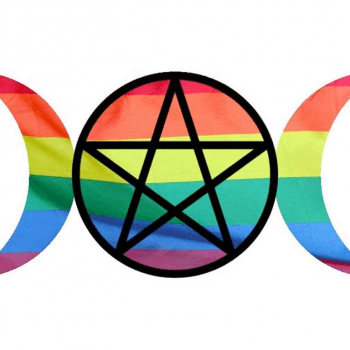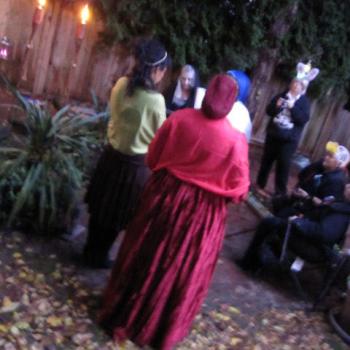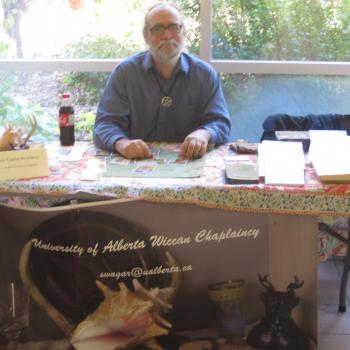
My version of Wiccan theology is panentheistic and polytheistic. The goddesses and gods are present and partly embodied in every aspect of the material world, numerous individual beings with different sets of specific powers and interests. Human beings also differ and have different interests that predispose both humans and deities to form relationships with one another based on our affinities. Although all Gods of both sexes and a range of genders could potentially be one’s Matron or Patron, we usually begin by building relationships with the most generic and least personal (the female principle and the male principle) and the sex that corresponds to the physical sex of the person connecting with the deity.
The Gods have Their own opinions and often a specific Goddess or God will come to a person and claim a person as Their servant. This highly prized development is one goal of early stages of coven training – to acquire a Matron (and eventually also a Patron) deity to oversee and participate in the Wiccan’s training. In a polytheistic religion people have relationships of respect and worship with several different Goddesses and Gods while being really close and tight with only a couple.
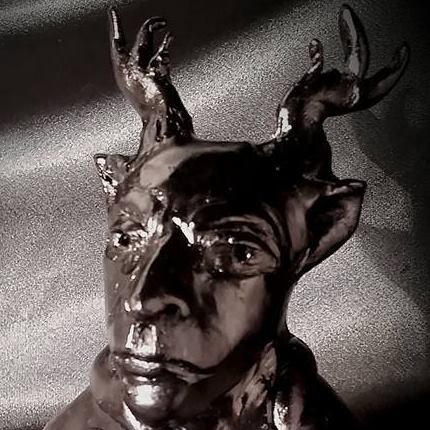
There are generally three ways that Matron or Patron relationships are formed (and, by the way, these relationships are not always exclusive, although they usually are, and people may have these relationships with different deities as they change and grow – typically being adopted by different deities at each level of Initiation):
1) The God chooses. For whatever reason, or for no reason that anyone can tell a Goddess or God will tap a person on the shoulder and say, “you are mine.” Sometimes it’s as clear as that, but more often the realization of Her or His interest grows in odd coincidental moments, or a particular word or name of a deity will keep appearing in reading material, or dreams will prompt investigation.

2) As a person comes to a clearer understanding of who they fundamentally are and sees that a particular Goddess or God represents the best and strongest expression of that type of person.
3) The Goddess or God represents or embodies something that they desire to be and She or He will help them to become stronger in that area of life.

In all cases, this is not something for nothing. The Gods demand that a person work and serve them wholeheartedly in their areas of interest in return for help. Making agreements with the Gods obliges one to uphold their end of the agreement. Be careful what you agree to and be careful that you know Whom you are serving – a War Goddess like the Morrigan is not a kindly Mother and She dislikes being treated like one, the God Dionysus does not like people who are inclined to temperate behaviour but demands passionate excess, and so on.
It’s rather like having a powerful friend who takes one on as a protégé. In other words, devoting yourself to the God does not automatically guarantee you Their wholehearted support – that has to be earned – but that devotion gets Their attention. And you have the option of refusing to be involved with a particular Goddess or God, although you will then be frustrated in the areas They rule.
I am assuming that you are beginning here with a desire to find and connect with a Matron and Patron, or with a sense that Someone is trying to get your attention. Well, to begin with, do the research – Who is this Goddess or God, why are They interested in hanging around with you (or why are you interested in getting Their attention) and how do they like to be worshipped? It is gloriously inappropriate and insulting to assume that you know everything that you need to know by “listening to your gut” or by some syncretic “all Goddesses are One” balderdash. So, know to Whom you are speaking. And talk with them appropriately. There is no need to grovel, but an attitude of respect is good.
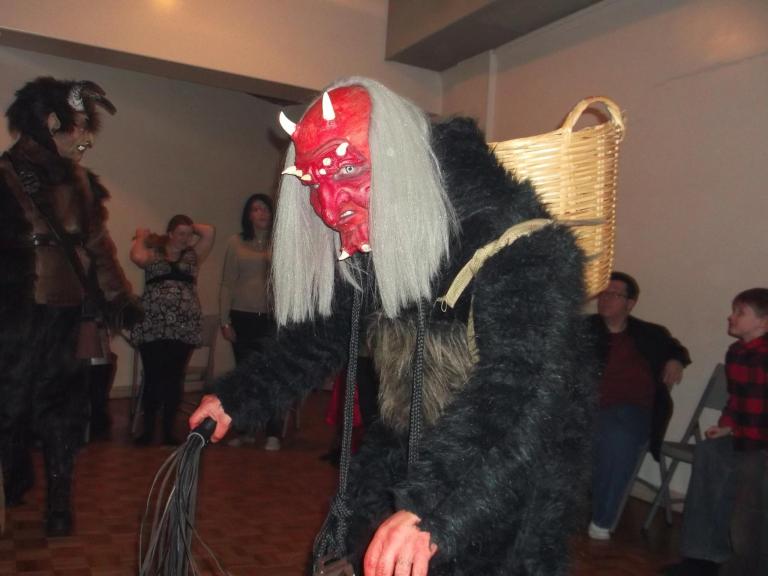
If there is a Goddess or God that has already tapped you on the shoulder and you feel drawn to develop a relationship with Her begin by doing some research – find one of the great stories, the myths. Set aside a small amount of time every day to read this story and to imagine yourself as a part of it.
In the stories, for example, of Demeter and Persephone in the Homeric Hymn to Demeter, you might take the scene where Demeter (in the form of an old woman) is the nursemaid to the young Demophon and she dips him into the fire to make him immortal only to be interrupted by his horrified mother, Metanira, before all of his body has been hardened. Begin as seeing yourself as a person, perhaps a slave, watching the scene unfold – what did you see, smell, feel, taste, hear? Later put yourself into the different actors in the story – Demeter, Demophon, Metanira – what did they experience, see, hear, smell etc. What was the result? How does this story show the Goddess’ beauty and power? As part of the meditation and prayer, talk with the characters in the story – make it real to you.
Dwell on the images arising in this story and others, feel as deeply as you wish, engage all of your senses in your imagination. Build as many details as you can, paying attention to everything. The meaning inside the story will unfold as it becomes part of your experience of life. This deliberate repeated use of inner visual and sensory experience, interacting with the story and its characters, and deepening the amount of sensory detail creates a stronger set of skills for connecting to the Gods.

Building the capacity for strong mental imagery is also central to trance journeying, guided meditation, pathworking, out of body experiences, and many shamanic practices. I suggest that people learning the skills take a minimum of twenty minutes a day for a minimum of a month to practice these skills and run through the exercise with their preferred stories of the Gods.
To move from the intensive training to making the relationship real involves both regular conversation and above all mindful service to the Gods as they work in the world. Ask, frequently, for help, and trust that your Matron and Patron are on your side as you strive to become stronger, better, more competent – it is not your accomplishment but your genuine effort and commitment that they appreciate and love in you. But doing nothing in service means nothing at all.








